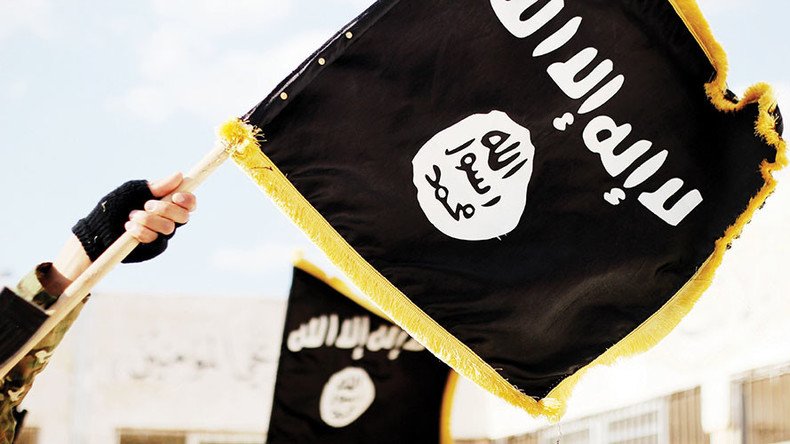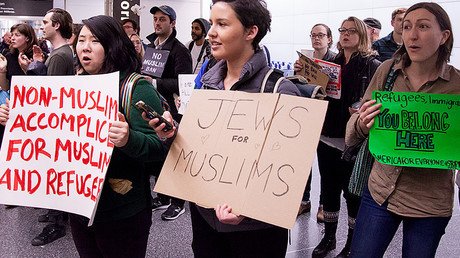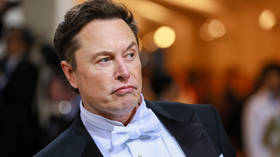Donald Trump’s travel ban is ‘propaganda opportunity’ for ISIS – home secretary

US President Donald Trump’s travel ban threatens to become a “propaganda opportunity” for Islamic State (IS, formerly ISIS/ISIL), UK Home Secretary Amber Rudd told MPs.
While giving evidence before the Home Affairs Select Committee, Rudd said although the move does not amount to a “Muslim ban,” people would “draw their own conclusions” about the nations that had been picked.
The seven mainly-Muslim countries covered by Trump’s ban are Iraq, Iran, Libya, Somalia, Sudan, Syria and Yemen.
“The sources of terrorism are not to be found in the sources where the president is necessarily looking for them,” she told MPs.
Responding to fears that IS may try to portray the ban as a sign of Islamophobia in the West, Rudd acknowledged the terrorist group would “use any opportunity they can to make difficulties, to create the environment they want to radicalize people, to bring them over to their side.
“It’s a propaganda opportunity for them, potentially,” she added.
Rudd said she made clear in a phone call to the head of the US Department of Homeland Security, John Kelly, that she disagrees with the travel ban and told him of the difficulties it is causing UK citizens and the “response that was taking place in London and across the country.”
Committee chair Yvette Cooper challenged Rudd on why she had not raised wider concerns about the travel ban with Kelly in the phone call.
“I think the important thing is for this government to state that we disagree with the ban and we have said that it is divisive, it is wrong. I will continue to say that,” Rudd said.
She told MPs “this will never be our policy. We have a completely different approach.”
Prime Minister Theresa May has also come under fire for failing to oppose Trump’s ban.
Ban Trump petition debate
Meanwhile, MPs have confirmed they will debate whether Trump should be given a formal state visit to Britain after a petition calling for the trip to be downgraded to mere official talks gained the support of more than 1.6 million people.
The debate on February 20 will also consider a rival petition in support of Trump’s visit, which has more than 114,000 signatures.
BREAKING: The counter-petition in favour of @realDonaldTrump's state visit to the UK has hit 100,000 signatures >> https://t.co/KMiwjEVQtrpic.twitter.com/OifPXM7k6Y
— RT UK (@RTUKnews) January 31, 2017
Signatories of the ban Trump petition should not get their hopes up, however. It emerged on Tuesday that fewer than ten of the thousands of appeals submitted to the House of Commons petitions committee have led to a change of policy.
More than 26,000 applications were submitted to the Commons petitions committee in the past 17 months.
Any that are deemed defamatory, unclear in their aims, party political, about a personal issue, or about honors or appointments can be thrown out.
Of the petitions permitted to stand on the parliamentary website for six months, fewer than 400 were backed by more than 10,000 signatures, the bar for receiving a response.
Of these, fewer than 50 gained 100,000 signatures and were thus debated in parliament.
Only seven have led to, or coincided with, government action to address the demands made by the petitioner.
Most expensive state visit ever
Rudd defended the decision to honor Trump with a state visit, arguing such events are designed for “honoring a country” as well as the president.
“The US is our strongest ally,” she added.
It’s not just the cost to political prestige that has been questioned, however. Trump’s state visit could be the most expensive in British history, the Times reports. Policing costs alone could very likely exceed £10 million (US$12.6 million) as such a visit would become a focal point for protests.
Britain has experienced two large demonstrations since the inauguration, with the Women’s March and protests over the travel ban bringing more than 100,000 people on to the streets.
Security planners believe a presidential visit would attract even greater crowds.
Dozens of opposition MPs have signed a motion calling for Trump to be denied the opportunity of addressing the Houses of Parliament, Westminster Hall or any other part of the historic building.
“On the program for the state visit, that will all need to be worked out in due course, the elements of that, and to look at it all – it’s months away, so there will be a discussion for that,” the PM’s spokesperson said.













